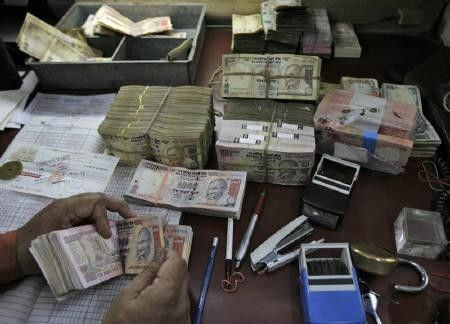Reserve Bank Of India Announces Financial Boosters; Investors Unimpressed, Markets And Rupee Lose Gains

In an attempt to boost growth and save the sliding rupee, the Reserve Bank of India (RBI) Monday announced a series of measures like allowing Indian companies to borrow more money from overseas for refinancing their outstanding rupee loans.
The RBI said in a statement that it would allow long-term investors and foreign central banks to be registered with the Securities and Exchange Board of India (SEBI) to invest in government securities and bonds. However, the announcements failed to cheer the markets as the investors' expectations were not met by the central bank.
The Indian companies in manufacturing and infrastructure sector are now allowed to avail external commercial borrowing (ECB) up to $10 billion.
Apart from this, Foreign Institutional Investors registered with the SEBI can invest a further amount of $5 billion in government securities, taking the overall limit for such investments to $20 billion.
The RBI has also included long-term investors like Sovereign Wealth Funds (SWFs), multilateral agencies, endowment funds, insurance funds, pension funds and foreign central banks to be registered with SEBI to the ambit of the FIIs that can invest up to $ 20 billion in Indian government securities.
It has also been decided to allow long-term investors like Sovereign Wealth Funds (SWFs), multilateral agencies, endowment funds, insurance funds, pension funds and foreign central banks to be registered with SEBI, to also invest in G-Secs for the entire limit of USD 20 billion. The sub-limit of USD 10 billion (existing USD 5 billion with residual maturity of 5 years and additional limit of USD 5 billion) would have the residual maturity of three years, the RBi said.
The Central Bank of India said that the decisions were taken in consultation with the government, and they would come into effect immediately.
The RBI said that the terms and conditions for the scheme for FII investment in infrastructure debt and the scheme for non-resident investment in Infrastructure Development Funds (IDFs) have been further rationalized in terms of lock-in period and residual maturity.
According to the new guidelines, the Qualified Foreign Investors (QFIs) can now invest in those mutual fund (MF) schemes that hold at least 25 percent of their assets (either in debt or in equity or both) in infrastructure sector under the current USD 3 billion sub-limit for investment in mutual funds related to infrastructure.
These steps aimed at boosting foreign capital inflow to the country is expected to halt the free fall of the rupee. The rupee and the markets in expectation of the RBI policies gained in the morning and early afternoon sessions. However, both rupee and Sensex narrowed the gains after the RBI announcement.
The RBI announcement disappointed the investors who had expected much stronger measures.
The BSE Sensex closed below the 17000 mark at 16882, down 90 points from the previous close and down 271 points from the day's high. At 2:39 pm local time, the rupee was at 56.96/97 against the dollar, weakening from 56.55 before the RBI announcement, Reuters report said.
© Copyright IBTimes 2024. All rights reserved.





















